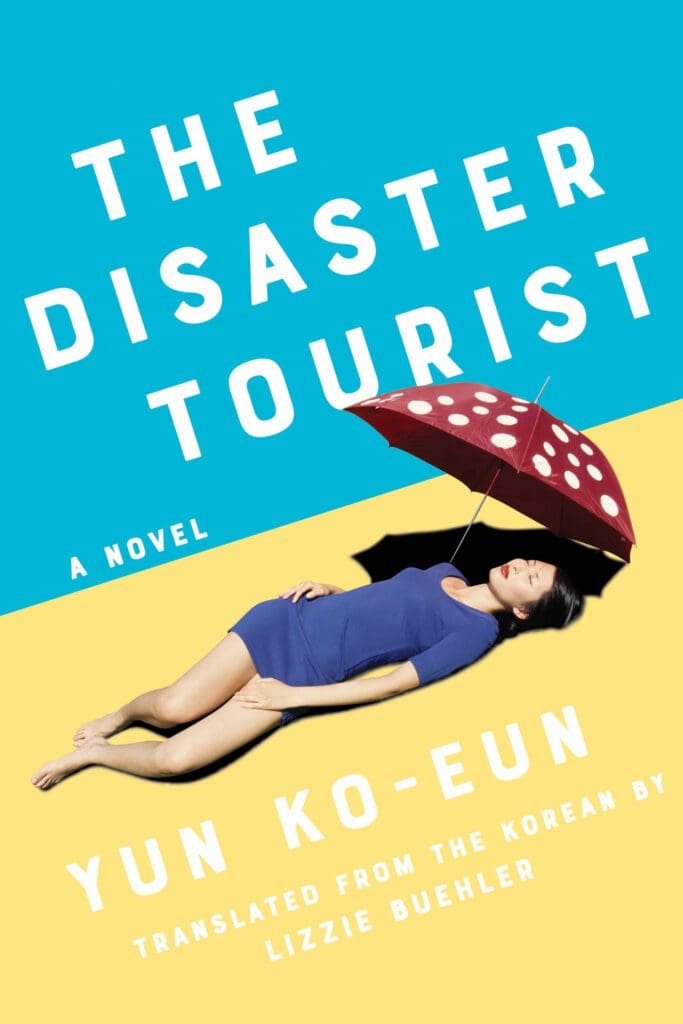Halfway through Yun Ko-Eun’s The Disaster Tourist (197 pages; Counterpoint Press; translated by Lizzie Buehler), the protagonist, Yona Ko, crumples up an itinerary. “I’ll decide where we go,” she says, and climbs onto a motorcycle and speeds away. It’s a representative moment for the overall novel, which is about power, who has it, and at what cost.
When we first meet Yona, she possesses an equable composure. At work, she scans headlines, searching emotionlessly for the latest catastrophe: tsunamis, massacres, earthquakes, wars. To these scarred landscapes, Yona designs travel packages for morbidly curious tourists clamoring for a firsthand look at an authentic disaster zone:
On a disaster trip, travellers’ reactions to their surroundings usually went through the following stages: shock → sympathy and compassion, and maybe discomfort → gratefulness for their own lives → a sense of responsibility and the feeling that they’d learned a lesson, and maybe an inkling of superiority for having survived. The stage someone reached depended on the person, but ultimately, adventures like these reinforced a fear of disasters and confirmed the fact that the tourist was, in fact, alive.
The Disaster Tourist is a tightly plotted, whip-smart satire, and the stakes heighten with every page. Ko-Eun’s writing is unpretentious, deadpan, and often very funny. She conceives Yona’s travel agency—“the company”—as a Kafkaesque bureaucracy. It is devilish and “all-encompassing,” but Yona is its brain. “Refunds,” she tells one dissatisfied customer, “are only possible in the case of death of the purchaser.” The company represents many things—capitalism, workaholism, mercurial authority—but most acutely, it represents that part of Yona—and of us—that craves catastrophe. Stories themselves, after all, are tours of conflicts designed for our consumption.
When Yona is sexually assaulted at work, she resolves not to protest in any way. “The moment you quit your job,” she realizes, “you had to restructure your entire life.” Instead, in the guise of a paid vacation, her company sends her to a location of her choice, the desert island Mui, where in 1963 a sinkhole opened up, killing many. There, by happenstance, Yona stumbles across a secret plan to hatch a fresh disaster. The unfortunate fact, the characters agree, is that disaster brings tourism, and tourism brings sustenance: “If disaster disappears from Mui,” one islander informs Yona, “life disappears, too.”
Typecasting gives the novel a surreal quality; rarely do characters have names. They are “the manager,” “the guide,” “the teacher,” and “the writer.” The writer merits our particular attention, as his presence in the novel invokes a distinct irony. Constantly he reads the most dire circumstances through a lens of personal gain: how can this event improve my story? Or conversely, how can I control an event by retelling it? Disaster, however, cannot be controlled. It comes most frighteningly at random. Eventually the writer realizes that “The story was racing ahead of [him], moving of its own accord”:
Ultimately, no city could ever completely evade catastrophe. Disaster lay dormant in every corner, like depression. You never knew when it might spring into terrible action, but if you were lucky, it could remain hidden for a lifetime.
The Disaster Tourist is Yun Ko-Eun’s first novel to appear in English. She masterfully weaves big-picture critiques of cultural appropriation and opportunism with the more delicate threads of human complexity. Yona is by turns immoral, decisive, and self-doubting. Rightly, she sees herself as caught in a web much larger than herself, one she has little control over. As a result, the moments when she does wield power seem all the more tense.
By the end, earthquakes and floods cannot faze Yona, and she faces “a greater disaster: her feelings.” This is the kind of disaster that cannot be captured in a photo or sold to a tourist. It is the kind of disaster that comes for each of us daily, and unlike Yona in this cautionary tale, we do well to face it head-on.

